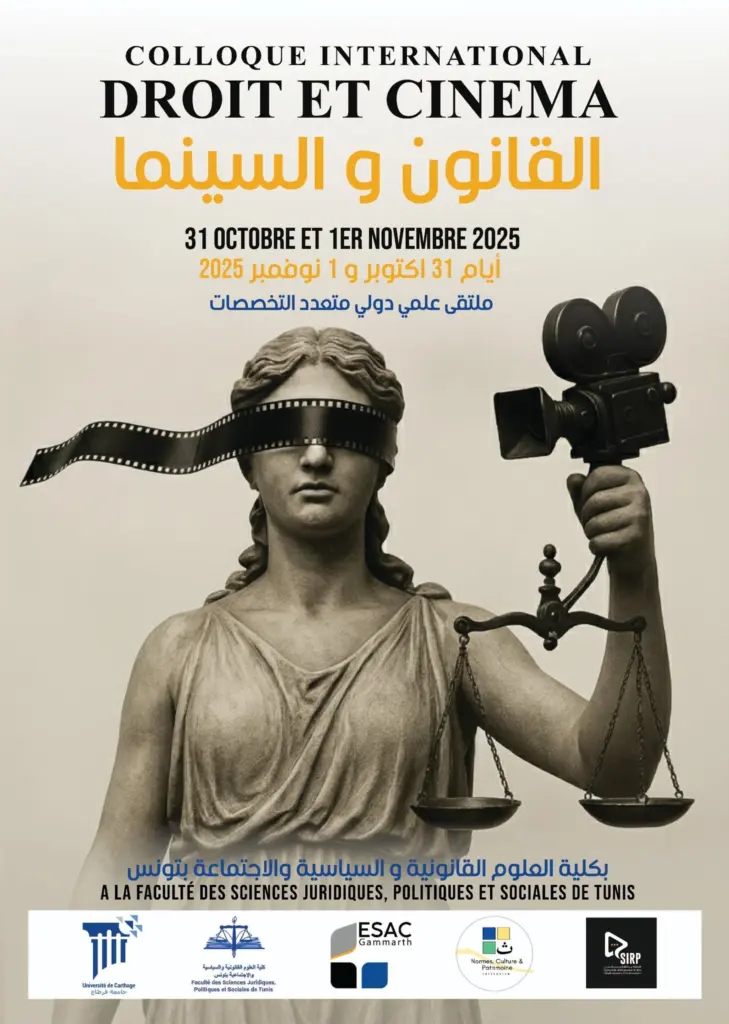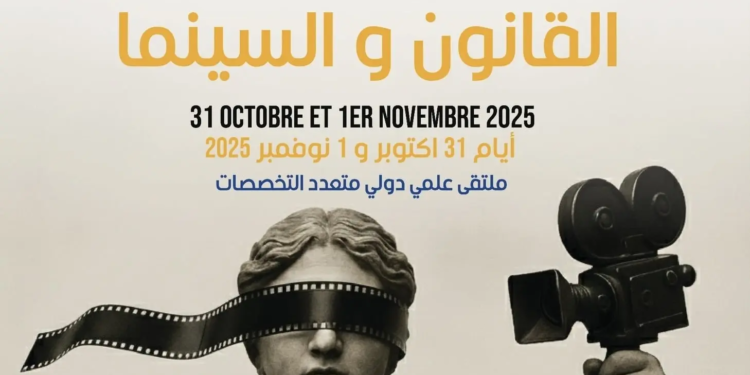International Conference Law and Cinema — October 31 & November 1, 2025, Tunis
Cinema is stepping into the halls of law. For two days, it won’t merely be screened or discussed — it will challenge, provoke, and reflect. This is the spirit behind the International Conference Law and Cinema, taking place on October 31 and November 1, 2025, at the Faculty of Legal, Political and Social Sciences of Tunis, in partnership with the Higher School of Audiovisual and Cinema (ESAC) and the Initiative Norms, Culture and Heritage.
At first glance, law and cinema seem to belong to opposing worlds. Law seeks order and certainty; cinema thrives on ambiguity and imagination. Yet when the two meet, a fascinating dialogue emerges — one that exposes the moral questions behind the rules, and the ethical weight of representation itself.
This conference will bring together legal scholars, filmmakers, critics, and researchers to explore how law shapes cinematic narratives, and how cinema, in turn, redefines our perception of justice.

Portraying Justice: Between Symbol and Story
The opening day will examine how law appears within cinematic storytelling — as a theme, a character, or a moral framework.
From Giovanni Rizzoni (Luiss University, Rome) to Ivan Capeller (Federal University of Rio de Janeiro), speakers will analyze the cinematic portrayal of power, judgment, and guilt, and the ways in which the courtroom has evolved on screen.
Beyond textual analysis, the real question is what cinema does to law — how the moving image transforms our understanding of truth, responsibility, and fairness. In a world saturated with images, where public opinion often replaces jurisprudence, this discussion feels more urgent than ever.
Cinema as Counter-Power
The second axis, Cinema as Propaganda or Critique of Law, explores the medium as both an instrument of authority and a site of resistance.
Chaired by Kamel Ben Ouanes, film critic and vice-president of the Tunisian Association for the Promotion of Film Criticism, and Sonia Chamkhi, filmmaker and writer, this session examines how cinema confronts institutions — sometimes serving them, sometimes subverting them.
Speakers from Italy, Canada, Tunisia and France will address topics ranging from visual jurisprudence on divorce, to post-revolutionary cinema, to the politics of representation in the Global South.
In societies where the law is fragile, suspended, or contested, the act of filming itself becomes a declaration of freedom.
The Right to Create
The second day, Saturday, November 1, will focus on the legal framework of film creation — authorship, copyright, funding, and the impact of artificial intelligence.
Chaired by Nouha Chaouachi and Mariam Ben Salem, this session will examine how law can both protect and restrict artistic expression.
Presentations by Géraldine Goffaux Callebaut (University of Orléans), Aïda Caied Essebsi (University of Tunis), and Ghazi Gherairi (Initiative Norms, Culture and Heritage) will raise key questions:
What defines the nationality of a film in a globalized industry? How do we safeguard freedom of expression while respecting collective ethics? Can the law keep pace with the creativity of technology?
Themis and the Camera
The conference poster speaks volumes: the Greek goddess Themis, blindfolded, holding not a sword but a camera.
In Greek mythology, Themis embodies natural law, fairness, and moral order. Her blindfold symbolizes impartiality, her scales the balance of justice, her sword the authority to enforce it.
But here, the sword is replaced by an instrument of vision. The camera becomes a new form of judgment — one that sees through emotion, perspective, and human experience.
By merging the icon of law with the tool of cinema, the image captures the essence of this encounter: film as a way to humanize justice, and law as a way to give meaning to images.
Between Structure and Freedom
More than an academic gathering, this conference invites participants to rethink justice as a sensory and imaginative experience.
Cinema articulates what the law cannot always say — feelings, injustices, ambiguities. Law, in turn, offers cinema a sense of structure and accountability. Together, they form a dialogue between rule and rebellion, order and empathy.
Between Themis’s scales and the camera lens lies a shared pursuit: the search for balance, for truth, for meaning.
Perhaps this is where the two truly meet — when law learns to listen to images, and cinema gives law a face, a voice, and a conscience.
📅 October 31 & November 1, 2025
📍 Faculty of Legal, Political and Social Sciences, University of Tunis
🎬 Open to the public — lectures, screenings, and discussions
Neïla Driss








